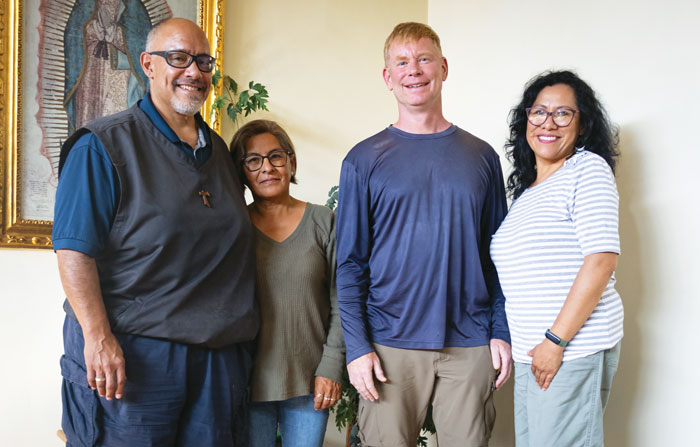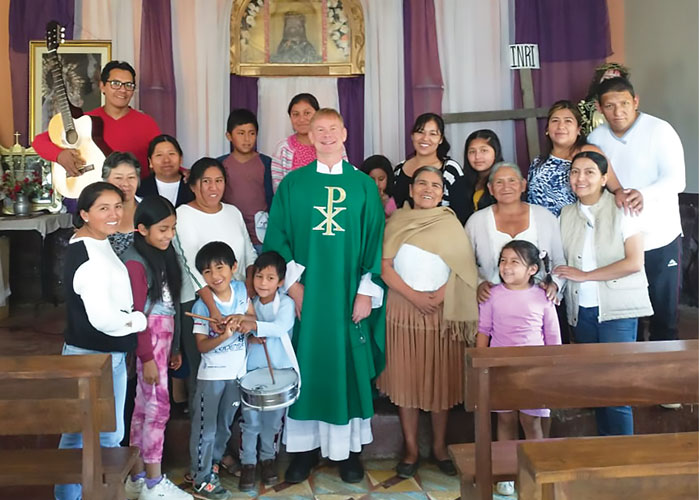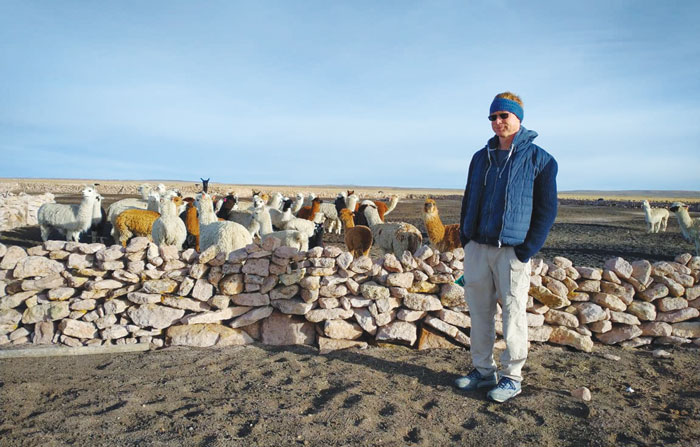A Maryknoll priest describes his learnings in ministry in Bolivia, where he and a pastoral team are forming a chapel community outside the city of Cochabamba.
When he was ordained four years ago, Maryknoll Father Gregory McPhee says, the term yanapanakuna was not part of his vocabulary. Now he spends every day putting this Quechua term into practice: “let’s help one another.”
Father McPhee, 54, is forming a chapel community in Los Molinos, a small village in the township of Tiquipaya. A 30-minute drive from the city of Cochabamba, the village is nestled in hills with abundant vegetation in an area known for flower cultivation.
“Los Molinos is in transition,” Father McPhee says. Most families — largely Quechua Indigenous — have been there for generations. In recent years, newcomers of retirement age have arrived, attracted to the tranquil setting and ready supply of water.
“The main challenge is building trust between the families,” Father McPhee says.
Sister Faviola Condori Quispe of the Missionary Sisters of the Thirsting Christ explains further. She and other young Aymara sisters, including most recently Sister Valeria Mita Uchupi, live and serve in Los Molinos, guided by the wise Sister María “Mery” Figueredo Valverde.
The chapel had fallen into disuse, Sister Condori says. Their pastor in the growing town of Tiquipaya had more than enough to do, and when he came to say Mass, attendance was too low to fill the chapel’s 50 seats. The sisters lamented the palpable lack of a faith community.
Problems they witnessed in Los Molinos included depression, domestic violence, untreated illnesses and overconsumption of chicha, a homemade fermented beverage.
“We were discouraged,” Sister Condori says.
“Father Greg suggested forming a team,” she says. Since coming to Cochabamba from La Paz, another region of Bolivia, the sisters have collaborated with Maryknoll priests.
“Our goal is to re-evangelize,” Father McPhee says, noting that in many places, the Church needs to be “reignited.”
Drawing on Maryknoll’s wide circle of partners in Cochabamba, he identified three laypeople to join him and the sisters.

Victor Artaiz, Rosse Mary Miranda, Father McPhee and Mabel Ramírez (left to right) hold a meeting at the Maryknoll center and residence in Cochabamba. (Adam Mitchell/Bolivia)
Victor Artaiz, of Wallingford, Connecticut, is one of them. Artaiz became a Franciscan Mission Service volunteer after a career in sales. During the COVID-19 pandemic, he found himself reflecting on the call to mission. “I was doing a lot of praying and reading my Bible, praying for guidance,” he says. He arrived in Cochabamba in January of 2022 and met Maryknollers in prison ministry. “I was immediately befriended by the Maryknoll community,” he says.
“My ministry is letting God lead me and sharing his word and applying the Gospel to daily life,” he continues.
“Victor delivers a strong message, especially for the men,” says Father McPhee, who also enlisted two Bolivian psychologists.
Mabel Ramírez Cornejo got to know Maryknoll through the Schools of Forgiveness and Reconciliation (ESPERE) program. She brings to the team her vast experience in family counseling.
“Our first step was going door to door,” she recounts. “The whole team went together to each house. Why? To get to know them, and from there to evaluate their needs.”
Of the approximately 100 houses in Los Molinos, a sizeable number are still under construction, but the team reached about 60 families.
“They have welcomed us,” Ramírez says. “Their openness is incredible,” she adds.
Making home visits “really gives me a sense of what’s going on,” Father McPhee says. “It’s one thing when people come to the sisters’ house, but when you go inside you see what they’re dealing with, how they’re living.”

Father McPhee joyfully celebrates Mass and the sacraments in Los Molinos, where he and a pastoral team are forming a chapel community. (Courtesy of Gregory McPhee/Bolivia)
“There was a case of an adolescent girl with epilepsy. It wasn’t the common kind,” Ramírez says. “She hadn’t been given the right medications, nor did she get tested properly.” Ramírez’s husband, a medical doctor, volunteered his services. He made sure that the girl, named Sheila, received adequate care and appropriate prescriptions. Father McPhee, who helped pay for the treatment, says Sheila is now doing fine.
Rosse Mary Miranda Miranda is another member of the pastoral team. As a Quechua speaker who lives in Tiquipaya, she offers an insider’s perspective.
The visitation campaign was a real success, she says: in this reserved, insular Indigenous culture, “our campesino brothers and sisters don’t usually open their doors” to outsiders.
Miranda, a psychologist who works with children, also points out that campesinos are unfamiliar with counseling. “They think only crazy people go to the psychologist,” she says. Yet a couple of families have already sought out therapy — provided free of charge.
It was Miranda who proposed the Quechua name for the team’s project: Yanapanakuna. “It encapsulates all the values of sharing, partnerships, solidarity and communal tasks,” she says.
To support the work in Los Molinos, the Missionary Sisters of the Thirsting Christ sell alpaca yarn. Traveling with Father McPhee to the mountains bordering Chile, they bought sheared fleece from families who raise alpaca herds.
The sisters wash, dye and card the wool, then use a drop spindle to spin the fibers into yarn. “We have a couple of buyers in the States,” Father McPhee says. He hopes to raise funds for repairs to the Los Molinos chapel.

On a trip to the Andean Altiplano last year, Father McPhee and the Missionary Sisters of the Thirsting Christ bought a supply of alpaca fleece. (Courtesy of Gregory McPhee/Bolivia)
Counseling and assistance for struggling families, Father McPhee explains, are only part of his vision. Indigenous people in Bolivia, he notes, tend to open up more in communities of trust. He envisions base ecclesial communities, also known as small Christian communities, to gather people regularly for prayer and Scripture reflection. Formation of lay leaders is key, as are workshops, such as one given last year at the sisters’ house on communication in the family.
Recently, classes in cooking and confection were held, also at the sisters’ house. These enable families to sell baked goods, thus supplementing their meager incomes.
Although the team’s goals are large, Father McPhee says, ministry begins with small steps. “As Americans we think of results. How many people do we get in, how many projects do we have, how much is the budget,” he says. “Right now, it’s much more about building relationships.” He shares that he draws inspiration from Saint Paul’s letters to the early Church.
A cradle Catholic, the young McPhee had fallen away from his faith until his late 30s. He came back to the Church while working as a criminal defense attorney in Syracuse, New York.
Ordained at 50, Father McPhee recalls the words that propelled him into mission: “Go, therefore, and make disciples of all nations” (Matthew 28:19a). “It was like Christ speaking to me,” he says. “I felt called to accompany people in our universal Church.”
The COVID-19 pandemic postponed his ordination and delayed his sendoff, but in April of 2021 the missioner arrived in Cochabamba. He first served at a chapel of the thriving, well-organized parish of Nuestra Señora de La Salette (Our Lady of La Salette), which introduced him to “the basics” of pastoral ministry in Bolivia.
At the Maryknoll Fathers and Brothers center in Cochabamba, he says, “I love the photos on the wall and the history of the work of Maryknoll. It was going out to the Indigenous and the poor.”
Now, in Los Molinos, Father McPhee says, he is serving in that same mission.
“Often, I felt before that I had to be the expert. I had to bring the message,” he says. “Now I am listening. I am seeing where is the place of trust, the Spirit of Christ in us — and among us — that’s teaching me that God is present.”
Featured image: Sister Faviola Condori Quispe, Maryknoll Father Gregory McPhee and Sister Clara Mamani Limachi (left to right) prepare alpaca wool yarn for sale to benefit their ministry in Los Molinos, a village on the outskirts of Cochabamba, Bolivia. (Adam Mitchell/Bolivia)
![]()

